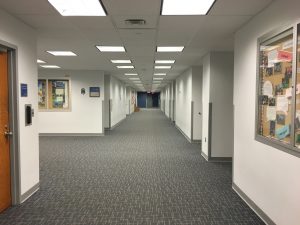Georgetown may already be in the nation’s capital, but for students who want more hands-on experience at the center of political action, the university’s new undergraduate public policy degree brings the Capitol to the classroom.
In February 2023, Georgetown announced a new A.B. in Public Policy, a joint program between the McCourt School of Public Policy and the College of Arts and Sciences. The first cohort of the Joint Program in Public Policy (JPPP), currently sophomores, must declare on the College’s Academic Program Changes Form by Nov. 1, 2024.
“We want to essentially provide a policy problem-driven degree that is interdisciplinary and provides students with experiential learning opportunities,” James Habyarimana, professor of public policy and the faculty director of the JPPP, said. “Georgetown is a university for change makers, and we think that this is a degree that gives those students the tools to engage more directly through other pathways.”
Enrolled students will spend their first two years on the Hilltop and their junior and senior years at the McCourt School on the Capitol Campus. The school is located at 125 E St. NW—a few blocks away from Capitol Hill, the Supreme Court, and Union Station—which also hosts the Capital Applied Learning Lab (CALL), a semester program based in downtown D.C. for undergraduate students to intern or participate in fellowships while taking classes.
“We’re trying to create the idea that this is one Georgetown, two campuses, albeit separated by half an hour of a commute,” Habyarimana said.
During their first two years, students will complete the College’s core curriculum as well as an introductory course, How Public Policy Works, which must be taken before the spring semester of their second year. In their junior and senior years, students must complete the four-course public policy core sequence while taking electives from four policy clusters—Environment, Energy, and Climate Change; International Development; Political Strategy and Governance; and Social Policy—and choose one to concentrate in. Students must also enroll in either an internship seminar or a policy lab on the Capitol Hill campus.
McCourt, which houses the program, was previously the graduate school for public policy. Since its move off campus in the summer of 2024, it will now serve both undergraduate and masters students, in an effort to make policy-making more accessible.
“There was a very strong intention by the university to move down here—to be closer to the policy capital,” Habyarimana said. “It opened up the question, ‘How do we give undergraduate students the opportunity to also take advantage of the location?’”
According to Habyarimana, the academic and social experience of students in the public policy major will likely be similar to that of students at the CALL.
Being at the CALL has allowed Francyne Diola (SON ’27) to take two internships downtown.
“The housing and being downtown is definitely really cool. We’re a 15-minute walk from the Capitol, a seven-minute walk from Union Station, so you have huge access to a lot of things,” Diola said, “I think Georgetown has a really big bubble that you stay in pretty well. But being here, you explore a lot more.”
To students, the location of the downtown campus is either the main appeal or a deal-breaker for declaring to the JPPP. The distance may alienate downtown students from the social, academic, and extracurricular scene on the Hilltop, some students said.
Judy Wang (CAS ’27), who is studying political economy and studio art, initially considered declaring to the JPPP after taking the introductory course before switching to her current majors.
“The class was really interesting and aligned with what I wanted to study,” Wang said. “It was a much more practical aspect of politics I wanted to go into and it would teach me a lot of hard skills. But then I learned more about it, and there’s just a lot of limitations with the major.”
Diola said that staying involved in campus life has been challenging while at the Capitol Campus.
“The community life is a little lackluster, for sure,” Diola said. “The trek, if you’re going to the main campus, is also tough sometimes because the GUTS is often late. If there’s traffic, a 20-minute drive ends up taking 45 minutes and you don’t want to go to class late.”
Furthermore, the JPPP restricts students’ options to double major or minor on the Hilltop.
“I’m double majoring in art right now, and I don’t think I can do that if I did the Public Policy major. For me, it really just came down to, ‘Am I willing to forgo something I’m really passionate about for another major?’” Wang said.
JPPP students who are interested in majoring or minoring in programs offered at the Capitol Campus, such as the B.S. in Environment & Sustainability, can still do so.
“We’re working on a wide range of minors that leverage our location,” Habyarimana said. “A minor that was just approved yesterday [Sept. 9] is the Law, Justice, and Society minor.”
For Annabelle Kim (CAS ’27), a student considering JPPP, the benefits of the program seem to outweigh the drawbacks.
“The two years at the Capitol Campus really put me off,” Kim said. “But for me, it’s still worth it. I really like the intro class, and I made a lot of good relationships with the professors. It feels more practical than just a government major.”
Habyarimana said the program hopes to respond and adapt to students’ concerns.
“We have a footing and an orientation to listen to what students would like us to do, but we’re still very much in the early stages,” he said. “I would say, as a policy school, this is very much in our DNA.”







